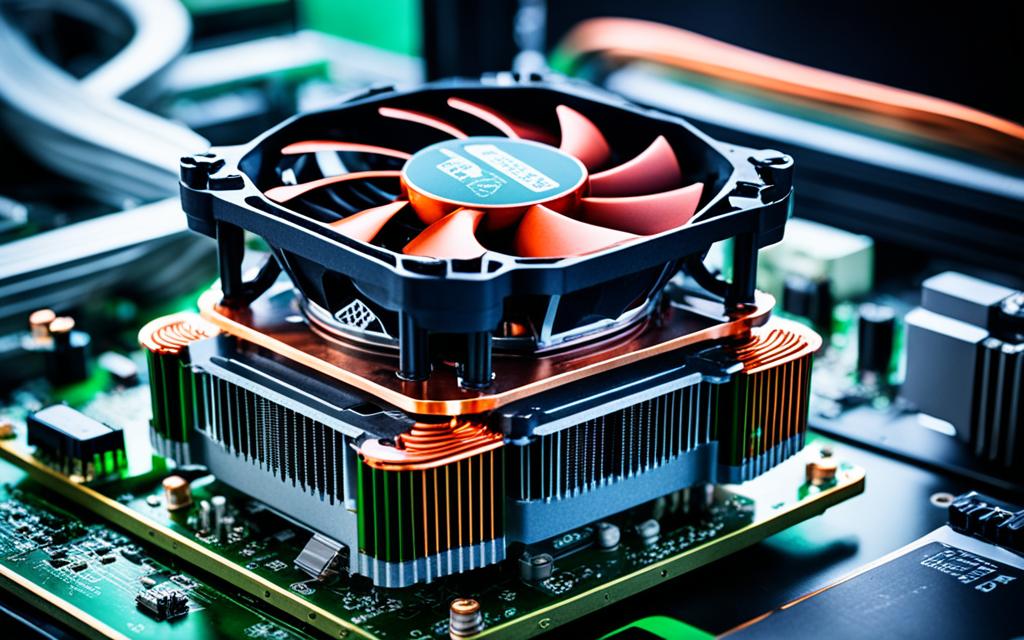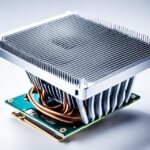Table of Contents
Knowing how to spot your CPU cooler model is key for keeping your computer cool. A reliable CPU cooler stops overheating which can cause big problems or even damage. It’s very important to know your cooler type if you’re fixing, upgrading, or changing parts. Many computer makers don’t share much about the coolers they use. In fact, 86% leave out the make and model from their info, and all OEM gaming PCs don’t tell you much at all.
This means it’s important to know how to find out what cooler you have. Whether your PC was built to order or came as a whole, having the right knowledge is vital. This helps you keep your computer running well and understand more about cooling systems. For more detailed information, check out this guide on making your own gaming PC1.
Key Takeaways
- Identifying your CPU cooler is essential for effective thermal management.
- Most pre-built PCs do not provide detailed information about their CPU coolers.
- A physical inspection of your cooler is a reliable method for identification.
- Community forums can be supportive resources for identifying CPU coolers.
- Compatibility checks are necessary to ensure proper installation with new hardware.
The Importance of Identifying Your CPU Cooler
Knowing how vital your CPU cooler importance is in your computer is key. It stops your processor from getting too hot, especially when you’re doing heavy tasks. This is crucial for your computer’s performance and the life of your parts.
CPU coolers come in various designs and features. Some have flashy RGB lights and screens but can be pricey. Yet, companies like Noctua and CoolerMaster have cost-friendly options. They offer coolers for less than $40-$502. Knowing what cooler you have is important. It helps pick the best option, especially for powerful CPUs like the Ryzen 9 or Intel Core i9.
Knowing your cooler type also aids in fixing problems. Many computers come with basic coolers that work for simple setups2. By understanding your cooler, you can stop overheating early. This keeps your system working well. It also aids in making good choices for maintenance or upgrading, keeping you ready for any computer performance challenges.
Visual Inspection Techniques
Checking your CPU cooler is key to knowing if it’s working well. Begin by opening the computer case. Make sure to turn off the power and disconnect all cables first. This avoids any risk of electric shock. Depending on your case, you might need a screwdriver to open it.
Opening Your Computer Case Safely
Get a screwdriver before you start. Your work area should be free from static to keep everything safe. Unscrew the side panel. It’s usually at the case’s back. Slide the panel off carefully to not damage anything.
Locating the CPU Cooler
After entering the computer, find the CPU cooler. It sits on the CPU and has a fan or a heatsink with fins. Learn about these parts. Look for labels on the heatsink. They can tell you the brand.
This check helps you know if your cooler works well with your system3.
Using Manufacturer Resources
Identifying your CPU cooler effectively can often be achieved by tapping into manufacturer resources. These invaluable tools provide guidance and information necessary for ensuring optimal functionality of your system.
Finding Information on the Manufacturer’s Website
Visiting the manufacturer’s website is a direct way to find key details about your cooler. By entering your PC’s model number in the search bar, you can likely find the CPU coolers that fit your system. It’s important to note that while many manufacturers provide specific details, some only offer general cooler descriptions. This may limit your understanding of which model you need.
Consulting the Product Manual
Your product manual is also crucial for identifying your CPU cooler. It contains specs and how to install them. Though some manuals might not detail the exact cooler model, they often list the compatible types for your system. If certain details are missing, using manufacturer resources can help clarify which coolers you can use45.
How to Know What CPU Cooler You Have
Finding out which CPU cooler you have can seem hard. However, it’s important for your computer to work its best. To figure out your cooler model, you need to look for special marks or labels on it. This guide will show you how to check your cooler for any unique features.
Inspecting the Cooler for Identifying Markings
Start by looking at the heatsink and fan for any signs that tell you the brand or model. Keep an eye out for the cooler’s specs listed on the device. These details are key for understanding what it can do and if it fits your PC. If you can’t find any marks, measure the cooler’s size to help identify it.
For a deeper look, you might need to check out the manufacturer’s specs. Knowing if you have an air cooler, AIO cooler, or a custom setup helps a lot. Remember, open-loop coolers cool better but are pricier6. High-end air coolers can do just as much as AIO ones, but they’re usually cheaper6.
To identify your cooler correctly, write down what you find. Make a simple chart comparing your cooler’s features and specs. This method will help you know your cooler model and check if it’s right for your PC.
| Feature | Details |
|---|---|
| Type | AIR/ AIO/ CUSTOM |
| Height (mm) | Your Measurement |
| Socket Compatibility | Intel/ AMD |
| Cooling Performance | Moderate/ High-End |
| Cost Estimate | Starting at $25 for air coolers, $60 for AIO |
By closely inspecting and noting down your findings, you can pinpoint your CPU cooler. This careful checking ensures it suits your PC’s needs, setting the stage for better performance and fit7.
Exploring Community Insights
Joining online communities can really boost your search for the right CPU cooler. Sites like Reddit and XDA Forums are full of useful tips and support. These places bring together fans ready to share their knowledge and stories.
Utilising Online Forums for Assistance
Online forums are great for finding help with CPU coolers. Share clear photos and details of your setup to get advice from experts. They clarify doubts about different models’ features and performance. This way, your system stays in top shape.
Posting for Help with Identifying Your Cooler
Asking for help in forums can spark helpful conversations. Explain your concerns, ask questions about potential issues, and talk about your cooler’s performance. This engagement can bring specific advice, helping you avoid expensive errors.
For those looking to learn more, there’s an article with tips on recognising and maintaining your hardware. It helps keep your system running smoothly. Find out more here8.
Third-Party Tools for Cooler Identification
When you can’t tell which CPU cooler you have by looking, use third-party tools. These programs dig deep into your system’s details. They tell you the cooler’s make and model. Make sure the software fits with your operating system for it to work right.
Identifying Your Cooler Using Detection Software
Many software choices help find out about your CPU cooler. CPU-Z and HWMonitor give detailed info on your system’s parts, like the CPU cooler9. You can also use Windows Hardware Device Manager. It gives important cooler information9.
Utilising CPU Monitoring Apps
CPU monitoring apps let you know how well your cooler works. Speccy and AIDA64 tell you what cooler you have and monitor fan speeds and temperatures9. Some AIO liquid coolers have their own apps for managing them. However, not all coolers come with software. This means you might need to use other programs to get the best performance10.
Checking Compatibility with Other Components
When you upgrade or replace hardware, fitting to the right CPU cooler is key. Start by checking the CPU socket types on your motherboard. Look for types like Intel’s LGA series or AMD’s AM4 and AM5 sockets. You’ll see common ones such as LGA1151 and LGA1200, and AMD’s AM5 (LGA1718) for Ryzen 7000 series processors1112. Make sure your cooler matches by comparing its specs with what your motherboard needs.
Understanding CPU Socket Types
Coolers fit different types of CPU sockets, so checking is a must. For example, AIO (All In One) coolers often fit Intel LGA sockets like LGA 115x, LGA 1700, and also AMD’s AM413. Knowing this stops you from picking a cooler that doesn’t match your setup.
Assessing Thermal Design Power (TDP)
The thermal design power (TDP) rating is key. Your CPU cooler’s TDP should meet or exceed your CPU’s TDP for best cooling11. Also, look at the cooler’s size to ensure it fits in your case. Check the mounting system and airflow too, as they affect how well it cools11. Getting these right promises top performance from your CPU.
Conclusion
For anyone who loves computers, knowing how to identify your CPU cooler is key. This guide has shown you how to find out which cooler you have. You might look at it closely, ask others, or use special tools. Knowing what your cooler does helps your computer run well, especially when you push it hard.
There are different kinds of coolers, from basic ones that are fine for everyday tasks to high-end options for heavy use. You might see air coolers with fins or heatpipes, and even fancy liquid cooling setups. These choices fit all kinds of needs and wallets1415. It’s important to think about how much heat your computer makes (TDP) and to pick something that works well with the rest of your gear. This helps you make a smart choice16.
To wrap it up, this guide on figuring out your CPU cooler is super useful for making your computer run better, whether you’re upgrading or just checking things. Keep these tips in mind as you dive into the tech world. They’ll help you have a smooth and powerful computing journey. If you want to learn even more about how processors work, check out this detailed guide on CPU rankings.
FAQ
How can I identify the model of my CPU cooler?
To find your CPU cooler model, open your computer case carefully. Look for the cooler on the CPU. Search for any signs, labels, or logos on the fan or heatsink. If you find nothing, check your PC’s model on the maker’s website or look in the product manual.
Why is it important to know my CPU cooler model?
Knowing your CPU cooler model is key to managing heat well. It stops overheating and keeps your system running longer. This knowledge aids in fixing problems, figuring out if upgrades will work, and choosing replacements.
What resources can I use to find my CPU cooler information?
You can find details about your CPU cooler through the maker’s site and product guides. Search for specifications that explain what cooler you have installed.
How do I perform a visual inspection of my CPU cooler?
First, switch off your PC and disconnect every cable. Then, open the case carefully. Find the CPU cooler and look for special marks like the brand or model. Note its design and size too.
Can online communities help with CPU cooler identification?
Yes, websites like Reddit or XDA Forums are great for advice. Post clear photos and a full description of your cooler. This way, experienced users can offer their help.
Q: What third-party tools can assist in identifying my CPU cooler?
Third-party tools and apps that monitor your CPU can identify your cooler by looking into your system’s details and how it performs. Make sure any software you use is safe and works with your operating system.
Q: How do I check if my CPU cooler is compatible with my components?
To ensure compatibility, know your motherboard’s socket type. Your cooler must match the needed specs for your CPU. Check if your cooler’s thermal design power (TDP) is sufficient for handling the heat.
Source Links
- https://www.xda-developers.com/how-find-cpu-cooler/ – How to find out what CPU cooler you have
- https://www.makeuseof.com/what-to-look-for-when-buying-a-cpu-cooler/ – 8 Factors to Consider Before Buying a CPU Cooler
- https://www.overclock.net/threads/is-there-a-visual-way-to-identify-if-a-fan-is-intake-or-exhaust-mode.1497960/ – Is there a visual way to identify if a fan is intake or…
- https://ms.codes/en-ca/blogs/computer-hardware/how-to-know-if-a-cpu-cooler-is-compatible – How To Know If A CPU Cooler Is Compatible
- https://ms.codes/blogs/computer-hardware/how-to-know-if-a-cpu-cooler-will-fit – How To Know If A CPU Cooler Will Fit
- https://www.tomshardware.com/reviews/cooling-buying-guide,6105.html – How to Buy the Right CPU Cooler: A Guide for 2021
- https://www.corsair.com/us/en/explorer/diy-builder/how-tos/how-to-find-out-which-cpu-you-have/ – What CPU do you have in your PC?
- https://www.linkedin.com/advice/0/how-do-you-determine-right-size-compatibility-e2gbe – How do you determine the right size and compatibility of a CPU cooler for your motherboard?
- https://ms.codes/blogs/computer-hardware/how-to-check-what-cpu-cooler-i-have – How To Check What CPU Cooler I Have
- https://www.makeuseof.com/specs-to-check-buying-aio-cooler/ – How to Buy an AIO Cooler: 5 Specs to Check
- https://softwareg.com.au/blogs/computer-hardware/how-to-know-if-a-cpu-cooler-is-compatible – How To Know If A CPU Cooler Is Compatible
- https://faqs.noctua.at/en/support/solutions/folders/101000187527 – Cooler FAQs
- https://www.corsair.com/us/en/explorer/diy-builder/cpu-coolers/aio-liquid-cpu-cooler-compatibility-with-cpus-and-motherboards/ – Which AIO Coolers are compatible with which CPUs and motherboards
- http://forums.absurdminds.net/viewtopic.php?t=266 – CPU cooler types – Absurd Minds
- https://greshanbovithanthrige.medium.com/whats-wrong-with-this-picture-777838ef2c3d – What’s wrong with this picture?
- https://ms.codes/en-ca/blogs/computer-hardware/how-to-choose-a-cpu-cooler – How To Choose A CPU Cooler








